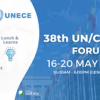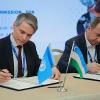News
Displaying Results 51 - 75 of 102
At what point do we cease to be alarmed by a shocking reality? Many of you may already be familiar with the following figures, from the last WHO Global Status Report on Road Safety (2018).
Every year 1.3 million people are killed and around 50 million injured on the world’s roads, often with…
In view of the upcoming COP 27 of the UNFCCC, taking place in Egypt later this year, the growing threats on climate created by the textile and leather sectors call for our urgent action. If we continue down this path, we will fail by 50% to meet our 2030 emissions reduction targets, resulting in…
Regional seas and coastal ecosystems, located either entirely or partly within the UNECE region, face growing environmental pressures caused by climate change, the increasing pollution loads, tourism, fishing, mining of minerals, and energy production (such as offshore wind power plants). These…
Evidence, in the form of data and statistics, is essential for formulating and monitoring policies. The term ‘evidence-based decision-making’, so commonly used that sometimes we don’t even think about it, makes this abundantly clear.
But we don’t just need any old evidence. If we are to be sure…
UNECE was engaged at the main global forum to assess and discuss progress in implementing the Sendai Framework for Disaster Risk Reduction (DRR) – the seventh session of the Global Platform for Disaster Risk Reduction (GP2022) held in Bali and online, 25-27 May 2022, fully embracing its theme: “…
Recent disruptions of supply chains have exposed fragilities in the current trading system and brought to light the importance of resilience and transparency in global trade.
UNECE and other international organizations play a crucial role in supporting countries (including both the public and…
The textile industry is a key driver of Uzbekistan’s economy, reflected in the country’s rank as sixth largest cotton producer in the world. In 2021, the country accelerated the battle against its child and forced labor violations in cotton harvest according to a new International Labour…
As supply chains within the garment and footwear sector are becoming increasingly complex, the need for transparency is more relevant than ever. Consumers, investors and shareholders are pressing for transparent business activities as well as the prevention and mitigation of risks in value chains,…
Cities, which are already responsible for around 75% of global CO2 emissions, are also at the forefront of fighting climate change and simultaneously are particularly vulnerable to its impacts. Urban trees and forests have been highlighted as a solution that can help to achieve the SDGs and make…
Global trade has been transformed repeatedly throughout history, driven by new business processes and new policies. The new advances in digitalization now promise further transformation by making it faster, more transparent, reducing risks of red tape and corruption. With the increase in global…
Over 60 participants worldwide joined the online roundtable organized by the UN Digital transformation group for Europe and Central Asia (DTG4ECA) in the framework of the Regional Forum on Sustainable Development for the UNECE region. Established in May 2020, DTG4ECA group, co-chaired by UNECE and…
As guests of the planet, we human beings can thrive only if our host environment is thriving. We are strongly connected to it, more than we probably understand and more than we probably dare to admit.
Conversely, the ways humans treat the environment has clear negative effects on our health and…
We probably all know what a potato is and how we prefer to eat it. But do you know what a seed potato is, and why seed potato certification matters? And did you know UNECE has a standard for seed potatoes?
Potatoes is one of the easiest vegetables to grow, as old potatoes that have grown buds can…
Millions of people are experiencing the severe impacts of climate change, through unprecedented extreme weather episodes and more frequent disasters. According to the Chair of the Intergovernmental Panel on Climate Change, Hoesung Lee, its latest report, released last week, “is a dire warning about…
Minerals such as lithium, cobalt, and copper are essential for digitalization, for renewable energy technologies, and for the further deployment of electric vehicles. Demand for these and other minerals – known as “critical raw materials” (CRMs) – is growing fast as governments and businesses act…
Strengthening value chains between Africa and the European Union (EU) is a priority objective for sustainable growth and decent jobs across the two continents. Recent market imbalances and disparities, involving supply chain disruptions and lack of attention to the social and environmental impacts…
The global economy enters 2022 with new challenges. Almost two years into the Covid-19 pandemic the digitalization of transport and trade data flows is on top of the economic agenda. In response, UNECE organized its 4th workshop on trade facilitation, Single Window, and data sharing for the Western…
The COVID-19 pandemic and the lockdowns it triggered have affected mobility patterns in most countries and brought to the fore many issues that had not received enough policy attention until now.
For instance, the fear of the virus and the search for social distancing led to a historic decline in…
Trade facilitation is a key priority for Kyrgyzstan and its trading community for participation in the global and regional trading system. Under the project on “Strengthening the capacity of the Kyrgyzstan National Trade Facilitation Council to implement the WTO Trade Facilitation Agreement”, UNECE…
Complex global value chains include production facilities scattered all over the world. Sometimes, they may also involve practices of illegitimate subcontracting and undeclared informal work. In fact, their complexity and opacity make it very hard to gain accurate information about how and where…
COP26 was a positive step forward in the fight against climate change, but as the UN Secretary General pointed out in his comments: “it is not enough. We must accelerate climate action to keep alive the goal of limiting the global temperature rise to 1.5 degrees.” The compromise deal reflects the…
Over the last two weeks at COP 26, governments, the private sector and a wide range of actors have unveiled plans for climate action in crucial areas ranging from methane, to forests, finance, fashion, transport and far beyond. As US Special Presidential Envoy for Climate John Kerry put it in our…
As all eyes turn to Glasgow where world leaders have gathered at COP26 for crucial negotiations to cut greenhouse gas (GHG) emissions and limit global warming, UNECE experts highlight how improved transparency and traceability could be part of the solution. The private sector has a vital role to…
The Group of 7 nations (G7), six of which are UNECE member States (Canada, France, Germany, Italy, the UK and the US), took bold step towards reducing barriers to trade by agreeing on the principles to govern cross-border data use and digital trade. At their meeting in London on 22 October,…
Policymakers looking for innovative solutions to global problems are increasingly recognizing that the answers have been around for a long time even before the earth got populated by humans. Trees can help achieve pressing global objectives for sustainable development, biodiversity conservation,…


























